Learn about the Specified Skilled Worker Visa, including the application process, required documents, and key points.
For customers who
☑ Don”t have a bachelor”s degree or higher education but want to work in Japan.
☑ Are interested in on-site work in caregiving, automotive maintenance, construction, accommodation, agriculture, fisheries, food service, and manufacturing.
☑ Are the companies facing a shortage of caregiving professionals and looking to hire foreign workers.
☑ Are the companies interested in hiring international students who worked part-time at their restaurants during their studies as full-time employees after graduation.
☑ Are the employers want to continue employing foreign technical interns after their internship period.
☑ Are the companies in Japan dealing with a labor shortage and considering hiring foreign talent.
- What is a Specified Skilled Worker Visa?
- Requirements for the Individual Applying for a Specified Skilled Worker Visa
- Requirements for Companies Accepting Specified Skilled Worker Visa Holders
- Application Process for Specified Skilled Worker Visa
- Frequently Asked Questions
- Support and fees for the Specified Skilled Worker Visa
What is a Specified Skilled Worker Visa?
A Specified Skilled Worker Visa is a type of work visa in Japan. However, it differs significantly from the representative category of work visas known as “Engineer/Specialist in Humanities/International Services.”
This Specified Skilled Worker Visa was established to address the challenging situation of securing domestic talent in industries where it is difficult to do so. It aims to admit foreign nationals with specific expertise and skills in these industries to alleviate the shortage of manpower.
There are various differences in terms of the duration of stay, permitted activities, and required qualifications when compared to the so-called standard work visas. This visa is only obtainable for specific industrial sectors.
The Specified Skilled Worker Visa is further divided into two categories: Specific Skilled Visa (i) and Specific Skilled Visa (i).
Industries where Specified Skilled Worker can be employed – About specified industrial fields
In the context of the Specified Skilled Worker Visa, the industries where employment is allowed are limited to fields termed “Specific Industry Fields.” These are industrial sectors where, despite efforts to enhance productivity and secure domestic talent, there remains a difficulty in obtaining manpower, necessitating the recruitment of foreign workers to fill the shortage.
2As of October 2023, the Specific Industry Fields include 12 sectors (14 industries), but it is possible that the industries designated within the Specific Industry Fields may undergo periodic review and revision. In essence, industries recognized by the government as facing a shortage of manpower and acknowledging the difficulty in securing talent within Japan are certified as Specific Industry Fields.”
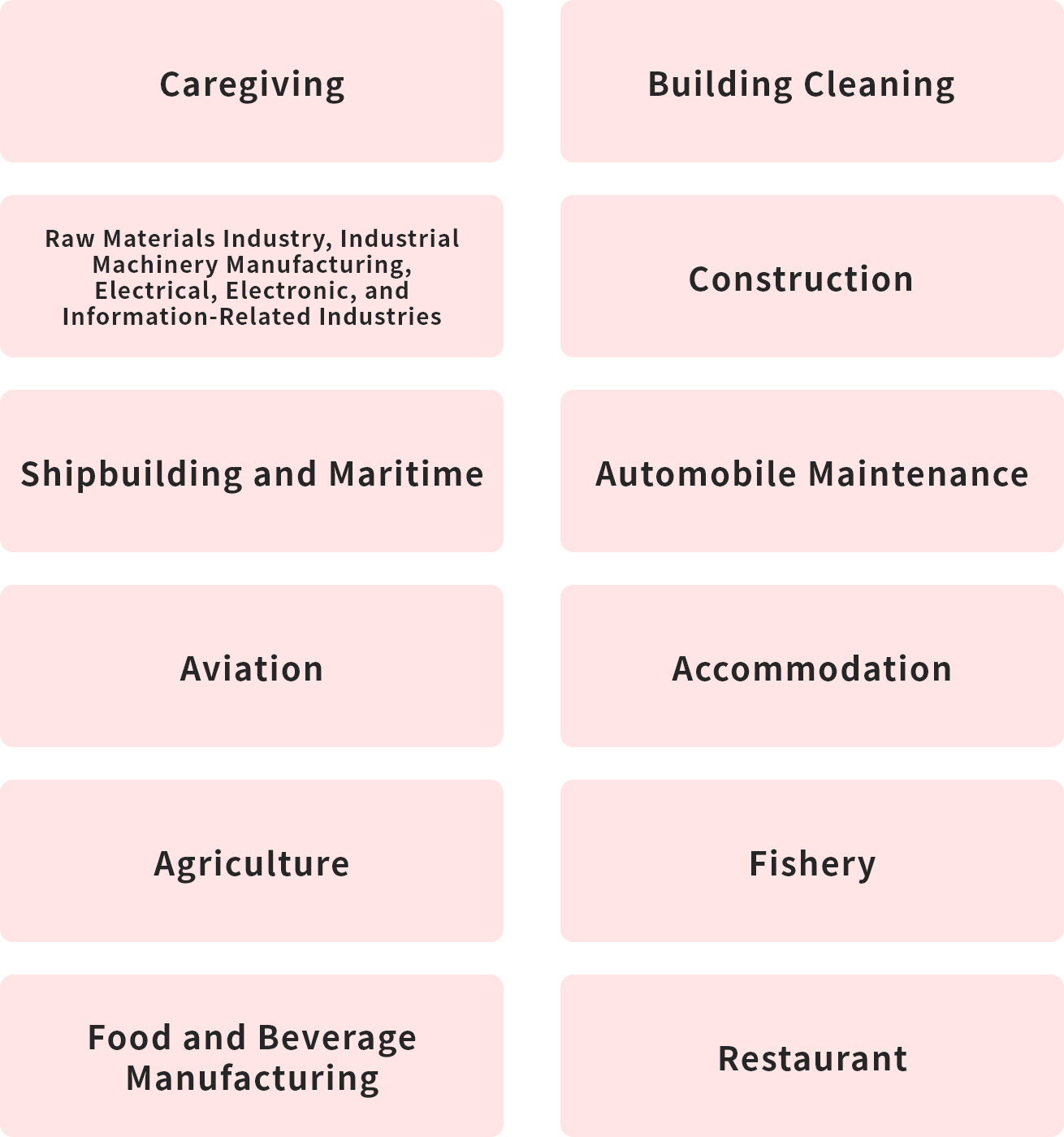
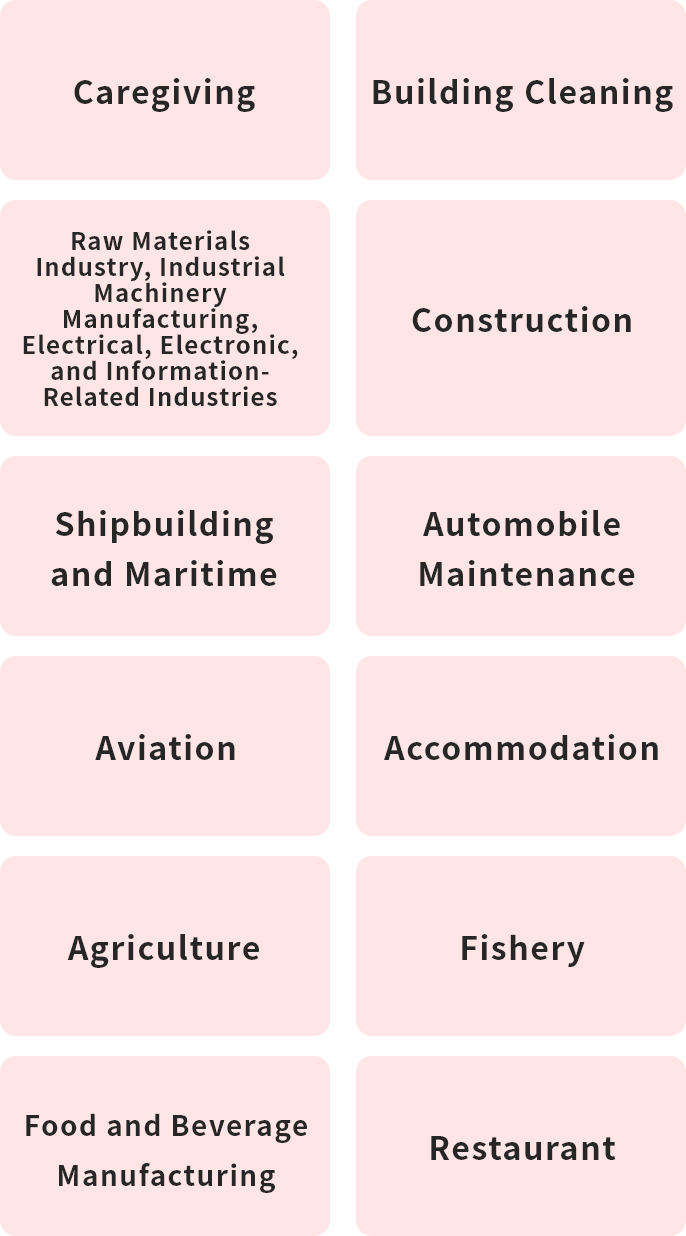
Differences between Specified Skilled Worker and Technical Intern Training.
The Technical Intern Training program is often compared to the Specified Skilled Worker Visa and is considered residence status when companies are contemplating accepting foreign workers. Let”s examine the differences between these two visas.
①Different Objectives of the Programs
The Technical Intern Training program aims to contribute internationally by allowing individuals from developing countries to acquire high-level Japanese skills through on-site training and disseminate these skills upon returning to their home country.
On the other hand, the Specified Skilled Worker Visa is designed to accept foreign nationals with certain expertise and skills in industries where securing domestic talent is challenging.
②Varied Permissible Work Content and Fields
The permitted tasks and fields for “Technical Intern Training” and “ Specified Skilled Worker” differ from each other. Just because a certain task or field is accepted under “Technical Intern Training” does not guarantee acceptance under “ Specified Skilled Worker,” and vice versa. There are cases where a task or field may be accepted under “ Specified Skilled Worker” but does not qualify under “Technical Intern Training.”
③Possibility of Job Change
In the Technical Intern Training program, the concept of “job change” does not exist, as the primary purpose is “training” rather than “employment.” Job changes are only possible based on the employer”s circumstances or during the transition from Technical Intern Training No.2 to No.3.
Conversely, since the “Specified Skilled Worker” visa is a work visa, it is allowed to change jobs if the individual meets the criteria of either “passing a Technical intern training evaluation examination in the same field” or “in the new field of employment” + Japanese Language Proficiency Test Level 4 or above (※ additional conditions apply for caregiving).
④Family Stay Eligibility
A Family stay visa allows the families of those holding work or study residence status to reside in Japan, However, it is only possible under specialized qualifications like “Engineer/Specialist in Humanities/International Services”, and it is not allowed under Technical Intern Training or Specified Skilled Worker Visa (i).
Also, Specified Skilled Worker Visa (ii) permits family stay for spouses and children residing in the home country only.
⑤Different Acceptance Methods and Employment Structures
The “Technical Intern Training” program is designed for skill transfer and international contribution through practical training. Therefore, the predominant acceptance method, constituting over 90%, is the organization-supervised type, where non-profit organizations accept technical trainees and conduct training under their supervision, often with affiliated companies. While it is also permissible for companies to directly accept staff from overseas subsidiaries or business partners for technical training, this approach is currently used by only a very small number of entities.
In contrast, the Specified Skilled Worker Visa operates similarly to the recruitment process for Japanese employees. Companies directly enter into employment contracts with foreign workers after confirming skills and mutual consent.
These are just a few of the differences and pros/cons between the two. There is also another major visa category for foreign workers, the Engineer/Specialist in Humanities/International Services visa, which is a representative work visa. For more details, refer to the table comparing Specified Skilled Worker Visa, Technical Intern Training, and Engineer/Specialist in Humanities/International Services Visa.”
| Specified Skilled Worker Visa(i) | Specified Skilled Worker Visa(ii) | Technical Intern Training (Supervision Organization) |
Engineer/Specialist in Humanities/International Services | |
|---|---|---|---|---|
| Purpose | Addressing labor shortages and international cooperation | Addressing labor shortages and international cooperation | International skill transfer International cooperation |
Not intended to address labor shortages, international cooperation, or national policies. Instead, instead, it is designed for foreign individuals to utilize their expertise in engaging in white-collar work. |
| Duration of Stay | Up to a total of 5 years (renewable every 1 year, 6 months, or 4 months) | Unlimited renewals (every 3 years, 1 year, or 6 months) 1st type: Within 1 year 2nd type: Within 2 years 3rd type: Within 2 years Total maximum of 5 years | No.1 Within 1 year No.2 Within 2 years No.3 Within 2 years Total maximum duration: 5 years |
No limit on the number of renewals 5 years, 3 years, 1 year, 4 months (for management, renew every 3 months) |
| Accepting countries | No restrictions, but agreements exist. (As of October 2023, Iran is not eligible) | No restrictions, but agreements exist. (As of October 2023, Iran is not eligible) | Restrictions apply, including Vietnam, Indonesia, Philippines, etc. Total of 16 countries (as of October 31, 2023) | No restrictions, |
| Educational Requirements/Work Experience | Not required | Not required | Not required | Required |
| Target Industries | Caregiving Building cleaning Manufacturing in 3 fields (Raw material industry, Industrial machinery manufacturing, Electrical/electronic information-related industry) Construction Shipbuilding/marine industry Automobile maintenance Aviation Accommodation Agriculture Fisheries Food and beverage manufacturing industry Restaurant industry |
Building cleaning Manufacturing in 3 fields (Raw material industry, Industrial machinery manufacturing, Electrical/electronic information related industry) Construction Shipbuilding/marine industry Automobile maintenance Aviation Accommodation Agriculture Fisheries Food and beverage manufacturing industry Restaurant industry (With the revision as of August 31, 2023, all fields of Specified Skilled Worker Type 1 visa have been expanded, excluding “nursing) |
90 occupations, 165 tasks (As of October 31, 2023) |
Engineering and technical professionals IT professionals Foreign language teachers Interpreters Trade affairs clerks, etc. |
| Employment Type | Direct employment only (except for fisheries and agriculture, where dispatch is possible) |
Direct employment only | Direct employment only | Direct employment or dispatch is possible |
| Skill Level | Verified through exams, etc. (Exemption for Technical Intern Training No.2 graduates) Requires a certain level of knowledge or experience (e.g., general laborer level) |
Proficient skill level verified through exams or similar assessments (e.g., site supervisor level) |
None (e.g., apprentice or entry-level) | None (However, practical experience or educational requirements may apply) |
| Japanese Language Proficiency | Japanese Language Proficiency Test (N4 or above) or the Japan Foundation Japanese Basic Test (A2 level or above) (Exemption for Technical Intern Training 2 graduates) | Japanese Language Proficiency Test (N4 or above) or the Japan Foundation Japanese Basic Test (A2 level or above) (Exemption for Technical Intern Training 2 graduates) ※Practically, no additional exam is required as transferring from Specified Skilled Worker (i) |
Not required (N4 level equivalent required for caregivers upon entry Japan) | Not required (However, depending on the nature of the work such as tranlation, proficiency at N1 or N2 level may be preferable) |
| Job Change | Possible within the same job or equivalent | Possible within the same job or equivalent | Generally not allowed | Allowed |
| Family Accompaniment | Not allowed | Allowed | Not allowed | Not allowed |
| Permanent Residency Application | Not allowed | Possible if requirements are met | Not allowed | Possible if requirements are met |
| Salary Level | Equal to or above Japanese standards | Equal to or above Japanese standards | Equal to or above Japanese standards | Equal to or above Japanese standards |
| Supervision/Support | Supervision and support by Specified Skilled Worker Affiliated Acceptance Institution or registered support organization | None | Practical training management by the supervisory organization | None |
Specified Skilled Worker Visa (i)
Specified Skilled Worker Visa (i) is a residence status designed for foreign nationals engaged in tasks that require a considerable level of knowledge or experience in fields falling under the Specific Industry Fields.”
Key Points of Specified Skilled Worker Visa (i)
Field: Limited to 12 specified feilds comprising 14 industries (details can be found here).
Age: 18 years or older (at the time of arrival in Japan).
Duration of Stay: Extension for every 3 years,1 year, or 6 months.
Skill Level: Verification through examinations or similar assessments.
Japanese Language Proficiency: Generally required to be confirmed through examinations or similar means (exemptions apply for Technical Intern Training No.2 graduates).
Accompanying Family Members: Not permitted.
Eligible for Support from Accepting Institutions or Registered Support Organizations:”
What is Specified Skilled Worker Visa (ii)?
Specified Skilled Worker Visa (ii) is a visa designed for foreign nationals engaged in tasks that require advanced skills in specified industry fields. Individuals who have completed Specified Skilled Worker Visa (i), passed the Specified Skilled (ii) examination, and have practical experience demonstrating advanced skills are eligible to obtain Specified Skilled Worker Visa (ii). Previously, Specified Skilled Worker Visa (2) was limited to the construction industry and shipbuilding/marine industry. However, as of the amendment on August 31, 2023, it has been expanded to cover all fields of Specified Skilled Worker Visa (i) except for “Caregiving”.
Key Points of Specified Skilled Worker Visa (ii)
Field: Limited to 11 specified industry fields comprising 13 industries excluding “Care,” covering all fields of Specified Skilled Worker Visa (i).
Age: 18 years or older (at the time of arrival in Japan).
Duration of Stay: Initial stay of 3 years, with subsequent renewals possible every 1 year or 6 months.
Skill Level: Confirmation through examinations and practical work experience.
Japanese Language Proficiency: No specific requirement for confirmation through examinations or similar means.
Accompanying Family Members: Possible if requirements are met (spouse and children).
Exclusion from Support by Accepting Institutions or Registered Support Organizations:”
※For detailed information regarding the Specified Skilled Worker Visa (i) skill examination, please refer to the Immigration Services Agency of Japan”s Examination Information website.
Requirements for the Individual Applying for a Specified Skilled Worker Visa
For Specified Skilled Worker Visa (i)
Passing the Specified Skilled Worker examination
To apply for a Specified Skilled Worker Visa (i), it is mandatory to pass the specific skills examination in the same field in which the applicant intends to work. This examination is conducted to verify whether the applicant possesses the skills that require knowledge or experience. Please refer to the following for a list of examinations.
| Specific Skill Test Contents | |
|---|---|
| Caregiving | Caregiving Skills Evaluation Test, Caregiving Japanese Language Proficiency Test (for caregiving only) |
| Building Cleaning | Building Cleaning Field Specific Skill Type 1 Evaluation Test |
| Raw Materials Industry, Industrial Machinery Manufacturing, Electrical, Electronic, and Information-Related Industries | Manufacturing Field Specific Skill Type 1 Evaluation Test |
| Construction Industry | Construction Field Specific Skill Type 1 Evaluation Test |
| Shipbuilding and Maritime Industries | Shipbuilding and Maritime Industries Field Specific Skill Type 1 Test |
| Automobile Maintenance | Passing either Automobile Maintenance Field Specific Skill Evaluation Test or Automobile Maintenance Skills Certification Exam Level 3 |
| Aviation | Aviation Field Specific Skill Evaluation Test |
| Accommodation | Accommodation Industry Skills Measurement Test |
| Agriculture | Agriculture Industry Skills Measurement Test |
| Fishery | Fishery Industry Skills Measurement Test |
| Food and Beverage Manufacturing Industry | Food and Beverage Manufacturing Industry Specific Skill Type 1 Skills Measurement Test |
| Restaurant Industry | Restaurant Industry Specific Skill Type 1 Skills Measurement Test |
If the examination is held in a country, individuals can take the test regardless of whether they are in Japan or abroad. Upon passing the examination, when applying for residence status, a copy of the Certificate of Completion of the Skill Test specified in the operational guidelines for each field is submitted.
For detailed information on the specific content of each field”s examination, please refer to the Immigration Services Agency of Japan”s website.”
Passing the Japanese language proficiency test
Foreign nationals applying for a Specified Skilled Worker Visa must pass either the “Japan Foundation Japanese Language Test (JFT)” or the “Japanese Language Proficiency Test (JLPT).” Upon visa application, a copy of the certificate of passing the examination must be submitted.
*As of the Cabinet decision on August 30, 4th year of Reiwa, it is anticipated that the range of acceptable examinations will expand beyond these two types, including those deemed equivalent to N4 level.
| Japan Foundation Japanese Language Proficiency Test (JFT) | Japanese Language Proficiency Test (JLPT) | |
|---|---|---|
| Implementation Period | Conducted six times a year both domestically and internationally | Conducted twice a year both domestically and internationally on July and early December every year, (with additional testing opportunities in certain regions overseas) |
| Passing Criteria | A2 level (can handle basic, everyday conversations without significant difficulty). | N4 level (can understand written sentences using basic vocabulary and kanji, and comprehend the meaning of spoken conversations, especially when spoken slowly). |
| Reference Official Website | https://www.jpf.go.jp/jft-basic/ | https://www.jlpt.jp/ |
For the case of successful completion of Technical Intern Training (ii)
As explained earlier, in principle, passing the Specific Skills Examination and the Japanese Language Proficiency Test is required. However, if an individual has successfully completed Technical Intern Training No.2 with good standing, there is an exemption from the Japanese Language Proficiency Test and the Specific Skills Examination requirements.
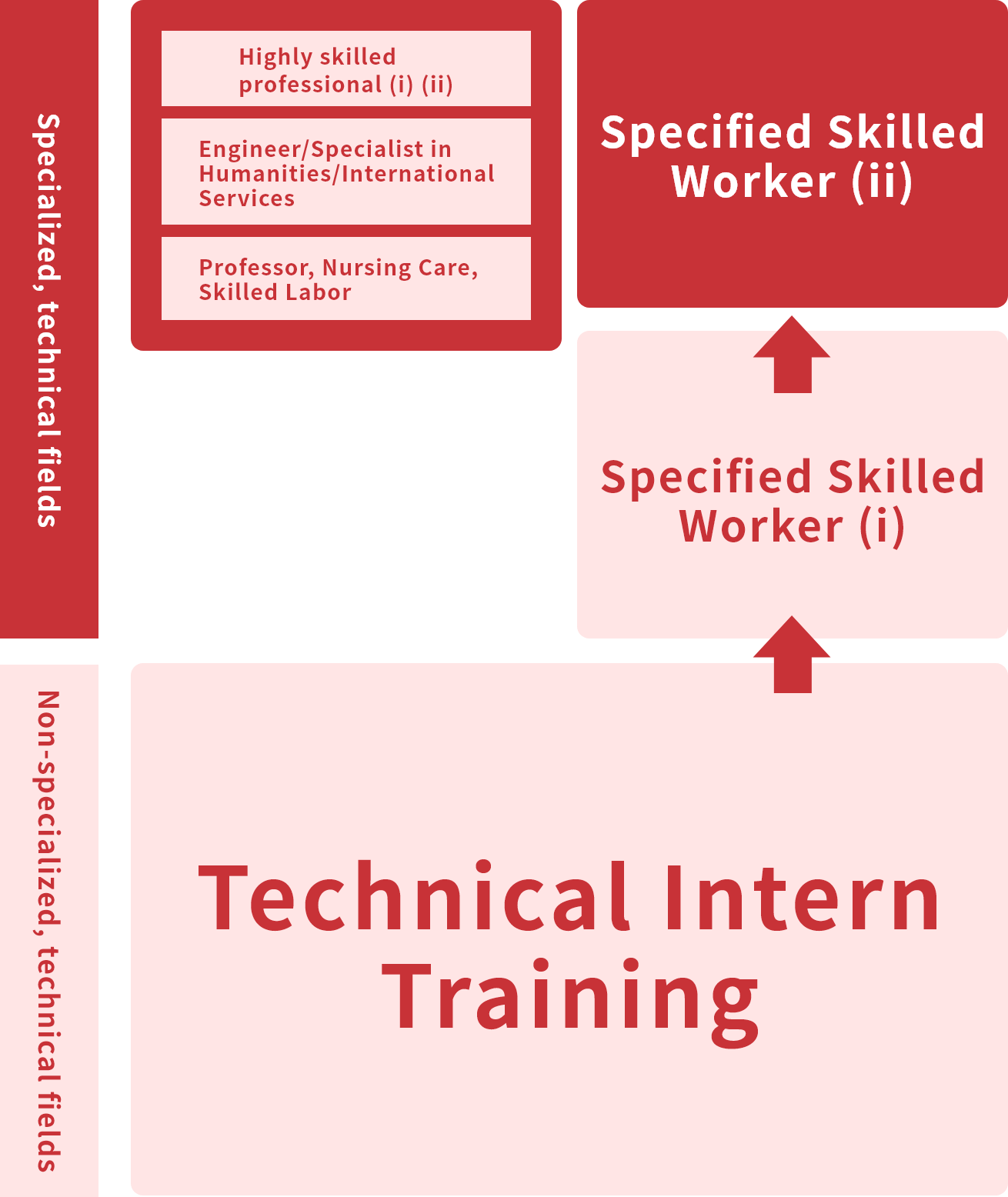
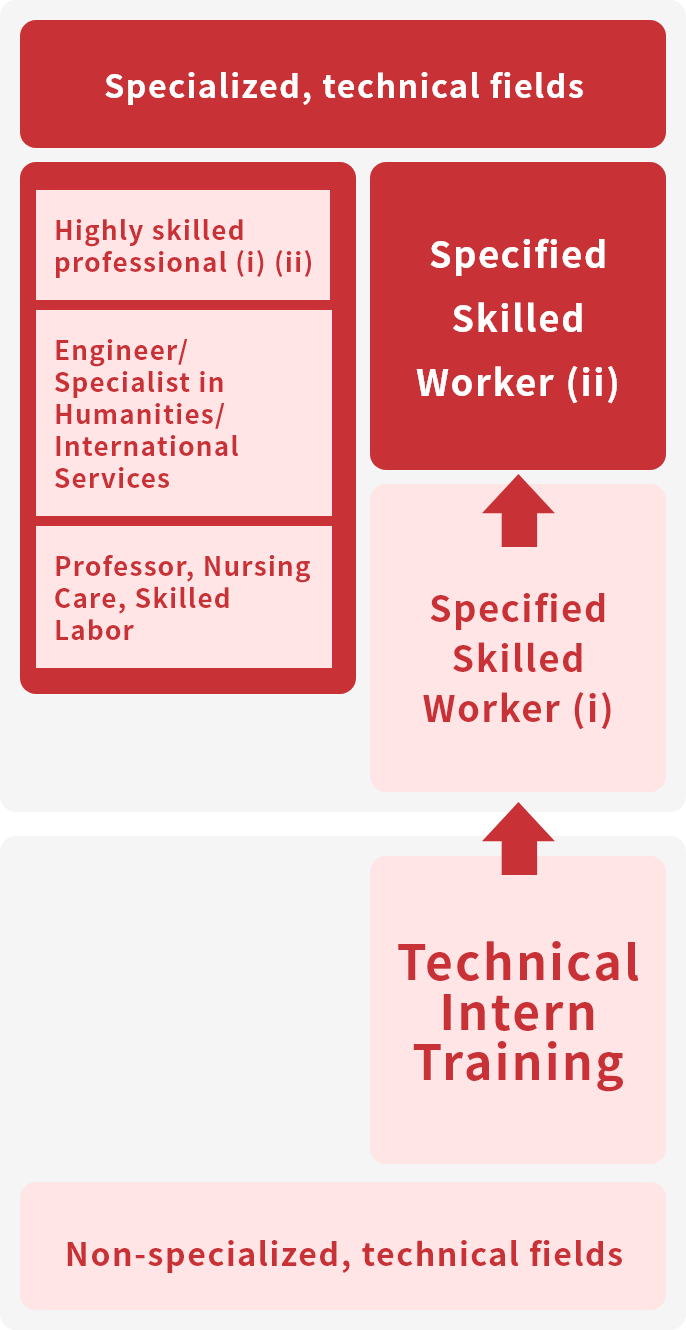
This “Technical Intern Training” is one of the residence status and visas, designed to accept foreign nationals from developing countries for a specific period. The aim is to contribute to international human resource development, transferring Japanese technology and knowledge to developing regions, thereby supporting economic development in such areas.
Technical Intern Training is divided into three categories, from No.1 to No.3, and it differs from the Specified Skilled Worker Visa in terms of its objectives and various other aspects. For a detailed comparison between Specified Skilled Worker Visa and Technical Intern Training, please refer to “Differences between Specified Skilled Worker Visa, Technical Intern Training, and Engineer/Specialist in Humanities/International Services.
| Technical Intern Training No.1 | First year of technical internship. |
| Technical Intern Training No.2 | Second to third year of technical internship. After completing one year of Technical Intern Training No.1, it is possible to transition to Technical Intern Training No.2 by passing the required exam. |
| Technical Intern Training No.3 | Fourth to fifth year of technical internship. After completing Technical Intern Training NO, it is possible to transition to Technical Intern Training No. 3 by passing the required exam. |
In good standing for Technical Intern Training” means following the planned Technical Intern Training and completing it for 2 years and 10 months or more. Even if an individual returns to their home country after completing Technical Intern Training No.2, Japanese Language Proficiency Test and Specific Skills Examination will be exempted if they are considered to be in good standing. In such cases, a copy of the pass certificate for the Skill Proficiency Test Level 3 or an equivalent exam, as well as an evaluation report on the technical intern, will be required at the time of applying for the residence status.
The term “transition” is frequently used in the context of Technical Intern Training. In this context, “transition” refers to changing from a “Technical Intern Training Visa” to another visa category such as a “Specified Skilled Worker Visa,” or changing from a “Technical Intern Training No.1” Visa to a “Technical Intern Training No.2” Visa, indicating a shift to a different visa category.
When transitioning from a “Technical Intern Training” Visa to a “Specified Skilled Worker Visa (i)”, it is essential to demonstrate the relevance of the work and tasks performed under Technical Intern Training No.2.”
For Specified Skilled Worker Visa (ii)
Passing the Specified Skilled Worker examination.
To apply for a Specified Skilled Worker Visa (ii), it is necessary to pass the Specific Skills Examination in the same field in which the applicant intends to work. Please refer to the following list for details.
*Regarding the examinations measuring the skill level for Specified Skilled Worker Visa (ii), in addition to existing exams, new examinations will be established in each field. These new exams will be conducted based on the examination implementation guidelines by the relevant ministries and agencies overseeing each field and are scheduled to commence at various times.
| Specific Skill Test Contents | |
|---|---|
| Building Cleaning | Specific Skill 2 Evaluation Test in the field of Building Cleaning or Skill Proficiency Test 1st Grade (Building Cleaning) |
| Materials Industry, Industrial Machinery Manufacturing, Electrical, Electronic, Information-related | Pass both Business & Career Proficiency Test Level 3 and Specific Skill 2 Evaluation Test in the Manufacturing field, or Skill Proficiency Test 1st Grade |
| Construction Industry | Specific Skill 2 Evaluation Test in the Construction field or Skill Proficiency Test 1st Grade, or Single Skill Proficiency Test |
| Shipbuilding and Marine Industry | Specific Skill 2 Evaluation Test in the Shipbuilding and Marine Industry field or Skill Proficiency Test 1st Grade |
| Automobile Maintenance | Specific Skill 2 Evaluation Test in the Automobile Maintenance field or Automobile Maintenance Skill Proficiency Test 2nd Grade |
| Aviation | Airport Ground Handling: Specific Skill 2 Evaluation Test in the Aviation field. Aircraft Maintenance: Specific Skill 2 Evaluation Test in the Aviation field or Aviation Personnel Skill Certificate |
| Accommodation | Specific Skill 2 Evaluation Test in the Accommodation field |
| Agriculture | Specific Skill 2 Agriculture Skill Proficiency Test |
| Fisheries | Specific Skill 2 Fisheries Skill Proficiency Test |
| Food and Beverage Manufacturing | Specific Skill 2 Skill Proficiency Test in the field of Food and Beverage Manufacturing |
| Food Service Industry | Specific Skill 2 Skill Proficiency Test in the field of Food Service Industry |
Practical work experience
Demonstrating proficiency in skills acquired through years of practical experience is also required. Each specific industry field establishes criteria for practical experience.
For instance, in fields like overseeing multiple skilled workers, having practical experience in engaging in tasks while providing guidance, managing processes, or performing highly specialized and technical tasks based on one”s own judgment, or experience at a level where one can oversee operations as a supervisor while proficiently performing tasks with skilled expertise is necessary.
Requirements for Companies Accepting Specified Skilled Worker Visa Holders
Conditions for companies Accepting Specified Skilled Worker foreign workers
①The employment contract with the Specified Skilled foreign worker must be appropriate. The employment conditions and remuneration for Specified Skilled foreign workers must be fair and reasonable.
- Must be paid at a rate equal to or higher than that of Japanese workers engaged in equivalent tasks.
- Should not discriminate in the treatment, such as benefits and education/training, based on the individual being a foreigner.
- Engage the worker in tasks that meet the standards specified in the field-specific skill guidelines and operational guidelines.
- Working hours should be equivalent to the regular working hours of other employees.
- Make considerations, except when unavoidable due to compelling reasons, for granting paid leave if a Specified Skilled foreign worker requests temporary return to their home country.
②The accepting institution itself must be appropriate.
Companies accepting Specified Skilled foreign workers must comply with labor-related laws and maintain a proper working environment without violations.
- Must comply with laws and not fall under disqualifying factors such as being sentenced to imprisonment or a more severe penalty.
- Have not involuntarily terminated a worker engaged in similar tasks to a Specified Skilled foreign worker within the past year.
- Have not had any workers go missing within one year of employment contract or after contract conclusion.
- Have not entered into contracts stipulating the collection of a security deposit.
- Do not directly or indirectly burden foreign workers with the costs associated with supporting Specified Skilled foreign workers.
- Properly pay wages through appropriate transfers to savings accounts.
- Adequately file notifications for workers” accident insurance, etc.”
③Must have a support system for foreign workers.
The accepting company needs to create an environment that makes it easy for Specified Skilled foreign workers to work.
- Information provision and consultation systems in a language understandable to Specified Skilled foreign workers are in place.
- Systems are established to ensure the continued fulfillment of employment contracts, among other considerations.
④The plan to support foreign workers must be appropriate.
After employing Specified Skilled foreign workers, the accepting institution must adhere to the support plan, continue support, and fulfill various reporting obligations:
- Do not neglect various notifications to the Immigration Services Agency.
- Be able to create and implement a support plan for Specified Skilled foreign workers, as explained in the next section.”
⑤Joining the council set up by the relevant ministry for each specific industry (either before, simultaneously, or after depending on the industry). All accepting institutions that receive Specified Skilled foreign workers are required to become members of the council established by the relevant ministry for each specific industry. If unable to join the council, the accepting institution cannot receive Specified Skilled foreign workers.
Accepting companies must conform to the industry classifications specified by each ministry and meet the membership requirements of the council. The detailed procedures vary for each council. Therefore, it is advisable to confirm in advance whether and when you can join the council before accepting foreign workers.
In this way, during the acceptance period, it is essential to employ Specified Skilled foreign workers with appropriate conditions. If these conditions are not met, there is a possibility of receiving guidance or improvement orders from the Immigration Services Agency and becoming unable to accept foreign workers, so please exercise sufficient caution.
The obligations of accepting institutions include
① Ensuring the faithful fulfillment of employment contracts with foreign workers
② Appropriately implementing support for foreign workers
③ Various notifications to the Immigration Services Agency and Hello Work
After accepting Specified Skilled foreign workers, accepting institutions must regularly or promptly report the acceptance situation and related matters to the local Immigration Services Agency and Hello Work.
What notifications the accepting institutions must make?
◆Ad-hoc notifications◆
・Notification of changes, terminations, or new contracts related to Specified Skilled employment contracts and support agreements with registered support organizations
・Notification of changes to the support plan
・Notification in case of difficulties in accepting Specified Skilled foreign workers
・Notification in case of knowledge of fraudulent acts related to entry and exit or labor-related laws
・Notification of information such as names and statutes of residence when hiring or separating from foreign workers (this should be reported to Hello Work, not the local Immigration Services Agency)
◆Regular notifications◆
・Notification of the status and activities of Specified Skilled foreign workers
・Notification of the implementation status of the support plan
Creating a Support Plan
Specified Skilled Worker (i) is eligible for support from accepting institutions and registered support organizations. When accepting Specified Skilled (i) foreign workers, the accepting institution must support them in their daily life and work to ensure smooth integration.
Specifically, they are required to create and implement a Specified Skilled Worker (i) Foreign Worker Support Plan. This support plan is a mandatory submission when applying for residence status, making it a condition for the Specified Skilled Worker Visa application.
The support plan should include the following details
- Implementation details and methods of the 10 items specified in the ministerial ordinance as necessary for support in occupational, daily, or social life.
- Name and position of the support manager and support staff.
- Name and address of any other person when outsourcing the implementation of support through a contract.
- Registered support organization (only if outsourcing to a registered support organization).
Support Items


Ensuring the availability of personnel capable of interpreting foreign languages is a requirement, and providing such support is a burden for accepting institutions. Therefore, it is possible for accepting institutions to outsource part or all of the content of the Support Plan for Specified Skilled Workers (No.1) to registered support organizations. These registered support organizations must meet certain criteria and are officially recognized by the Director-General of the Immigration Services Agency through registration. If you are looking for registered support organizations, please refer to the Immigration Services Agency”s site “Registered Support Organization Registry.”
However, it is important to note that the expenses associated with such support must be borne by the accepting institutions rather than the foreign workers holding the Specified Skilled Worker Visa.”
Application Process for Specified Skilled Worker Visa
Application Procedure
Case where foreigners in Japan acquire the Specified Skilled Worker Visa
When a foreigner who is already residing in Japan applies for a Specified Skilled Worker Visa, the process is as follows:”
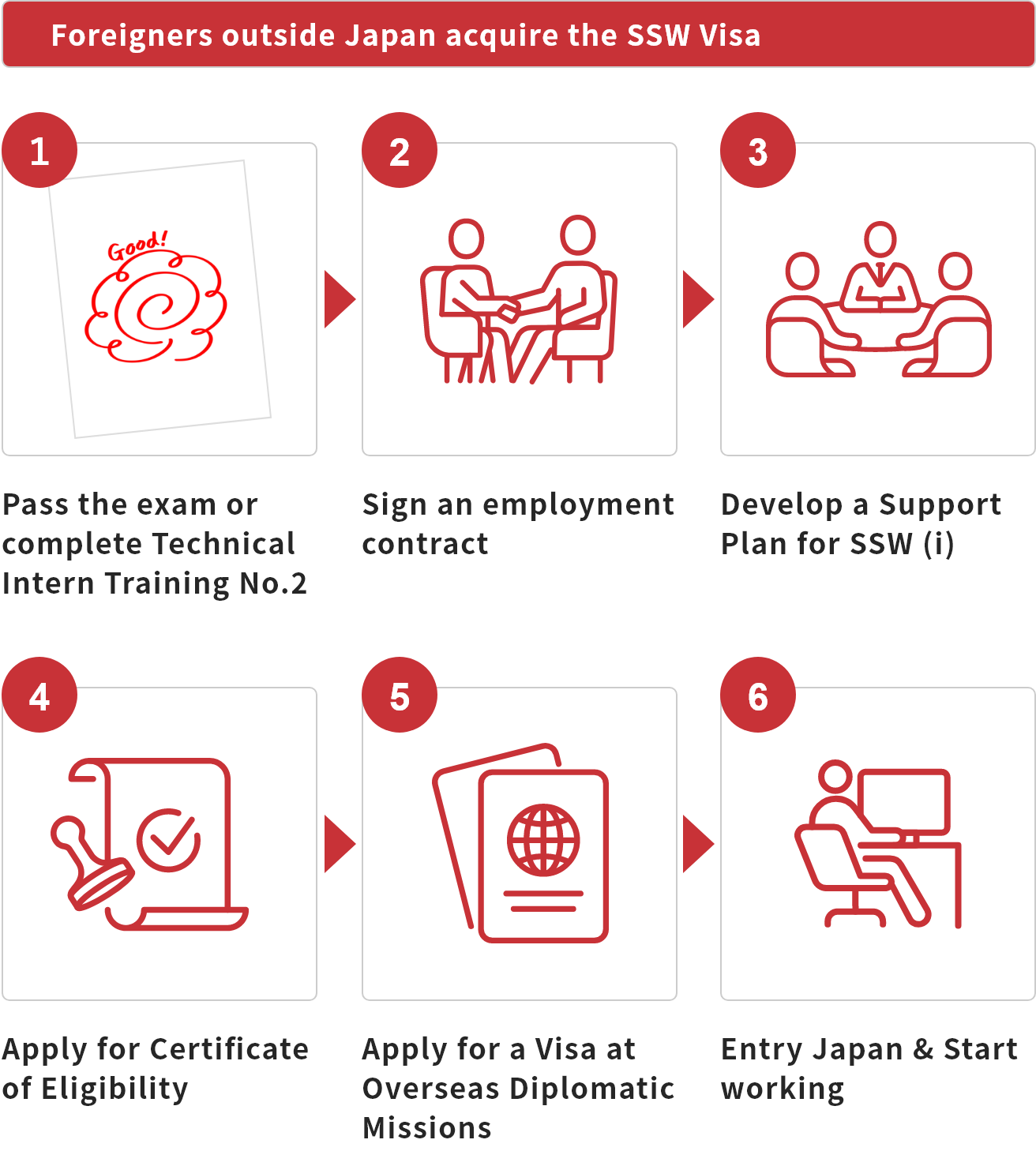
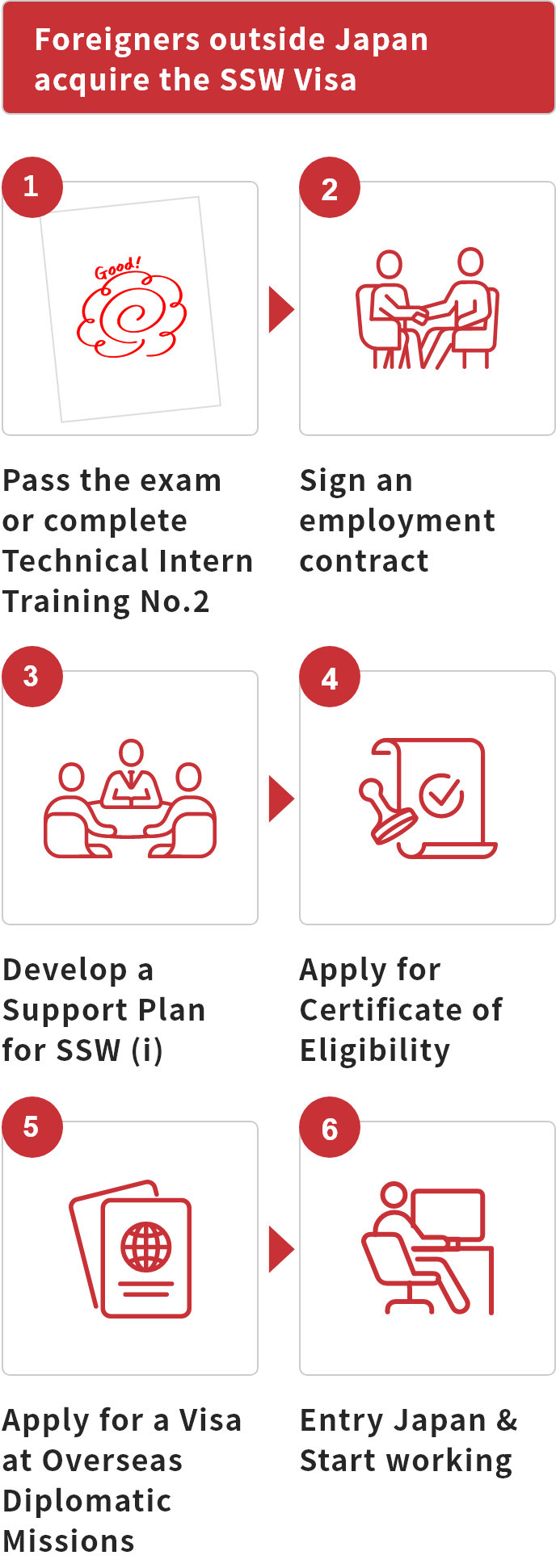
①Pass the exam or complete Technical Intern Training No.2
As explained in “2. Requirements for the Individual Applying for a Specified Skilled Worker Visa”, the foreigner needs to pass the specified skill field and Japanese language exams. If they have successfully completed Technical Intern Training No.2, exams are not required.
②Sign an employment contract between the Specified Skilled foreign worker and the accepting company
The Specified Skilled foreign worker and the accepting company enter into an employment contract. The accepting company must adhere to the conditions explained in “3.Requirements for the Company accepting Specified Skilled Worker Visa”. Once the employment contract is signed, the accepting company submits a notification of the specified skilled employment contract to the specified skill affiliation organization within 14 days.
③Develop a Support Plan for Specified Skilled Foreign Worker (i)
When employing a specified skilled worker (i), a Support Plan for Specified Skilled Foreign Workers (i) must be created and implemented. It is possible to have these plans created by registered support organizations, among others. Additionally, health checks and pre-guidance for foreigners are conducted.
④Apply for change of residence status
An application for a change of residence status permit is submitted to the regional immigration office.
⑤Change of residence status
Once the change of residence status is approved, the individual transitions to either “Specified Skilled Worker (i)” or “Specified Skilled Worker (ii)” and a residence card and designation certificate are issued.
⑥Commence employment
After completing these procedures, the individual can commence employment as a specified skilled foreign worker. Once employment begins, regular and ad-hoc reporting to the Immigration Services Agency is required. Additionally, any changes to the plan or employment conditions necessitate the submission of relevant documents as needed.
Case where foreigners outside Japan acquire the Specified Skilled Worker Visa
When employing a foreigner residing overseas and applying for a specified skilled worker visa, the process is as follows:
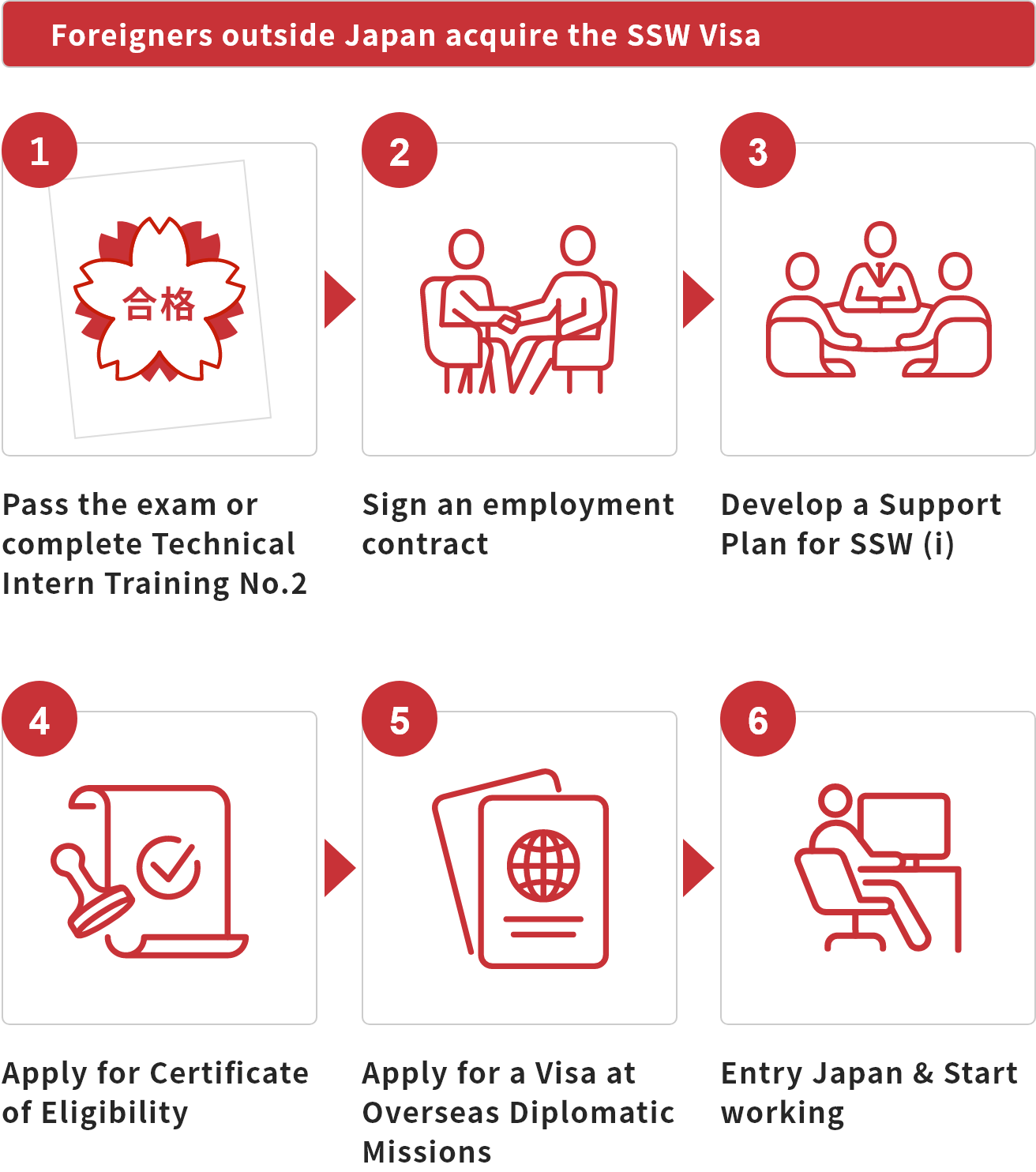
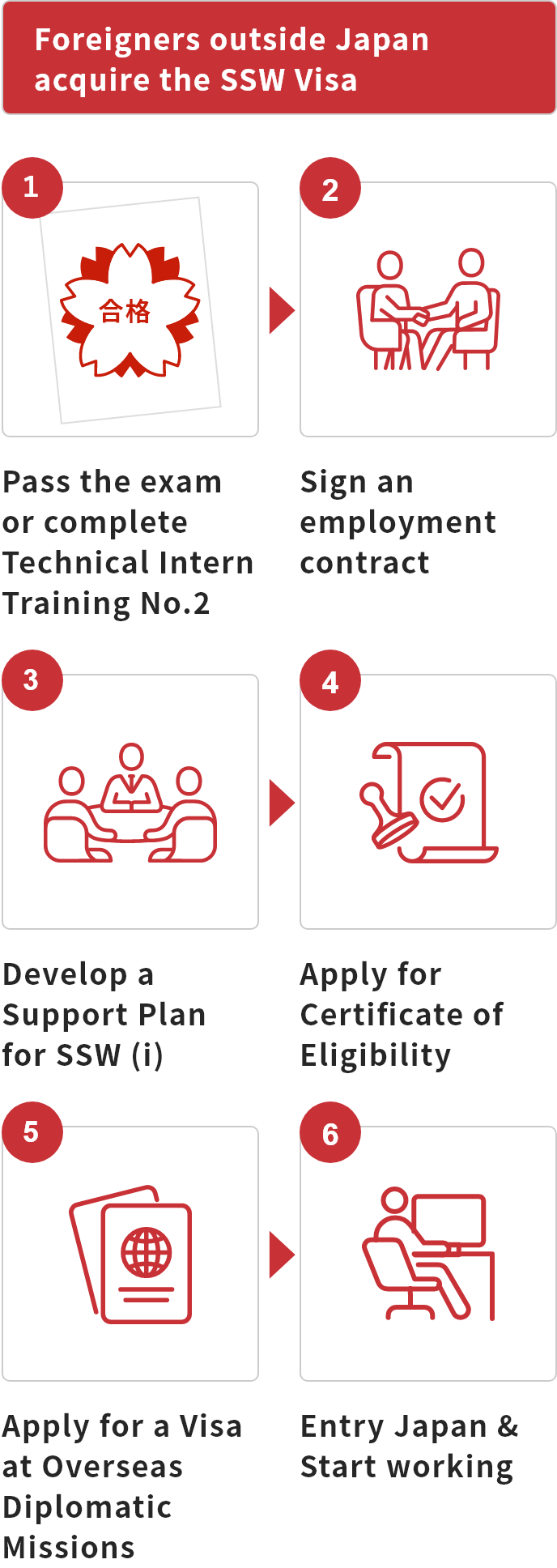
①Pass the exam or successfully complete the Technical Intern Training No.2
As explained in “2. Requirements for the Individual Applying for a Specified Skilled Worker Visa”, the foreigner must pass the exam or, if they have successfully completed Technical Intern Training No.2 in good standing, they are exempt from the specific field and Japanese language exams.
②Employment Contract Between the Specified Skilled Foreign Worker and the Accepting Company
The specified skilled foreign worker and the accepting company enter into an employment contract. At this point, the accepting company must adhere to the conditions outlined in“3.Requirements for the Company accepting Specified Skilled Worker Visa”. Once the employment contract is signed, submit the notification of the specified skilled worker employment contract to the specified skilled worker affiliation organization within 14 days.
③Develop the Support Plan for Specified Skilled Foreign Workers (i)
When employing a Specified Skilled Worker (i), the accepting company must create and implement a support plan for Specified Skilled Worker (i). It is possible to have these plans created by a registered support organization, among other options. Additionally, health checks and pre-guidance for foreigners will be conducted.
④Apply for the Certificate of Eligibility
Submit an application for the Certificate of Eligibility to the regional Immigration Services Bureau. The application is free, but the average processing time is 1 to 3 months.
⑤Apply for a Visa at Overseas Diplomatic Missions
Once you have received the Certificate of Eligibility, submit it along with other necessary documents to the overseas diplomatic mission and apply for a visa. Upon receiving the visa, enter Japan within the validity period of the Certificate of Eligibility, which is within 3 months.
⑥Entry and Commencement of Work
Upon entry, the Specified Skilled foreign worker can begin working. As newly arrived Specified Skilled foreign workers may not have established their living infrastructure, support will be provided following the Support Plan for Specified Skilled Foreign Workers.
Average processing period and Required Periods
The average processing period for the examination of the Specified Skilled Worker Visa itself is approximately 1 to 3 months. However, the entire process from initiating recruitment activities to start work may take 3 to 6 months in many cases. Particularly, when accepting a Specified Skilled foreign worker for the first time and when outsourcing to a registered support organization, various procedures such as finding a registered support organization and joining the council are required. Therefore, it is recommended to allow for a sufficient preparation period.
Required documents for Application
| Required Documents for Specified Skilled Worker Visa (General Examples): |
|---|
| ① Application for Certificate of Eligibility / Application for Change of Status of Residence 1 copy |
| ② Photo 1 leaf (4cm x 3cm) |
| ③ Certificate of Passing the Skills Test / Certificate of Practical Skills Test (e.g., Skill Proficiency Test Grade 3) |
| ④ Certificate of Japanese Language Proficiency Test |
| ⑤ Health Certificate for Specified Skilled Foreigners |
| ⑥ Declaration Form for Medical Examination by Specified Skilled Foreigners |
| ⑦Copy of the Specified Skilled Employment Contract and Employment Conditions ※1 |
| ⑧Important Matters Explanation for Specified Skilled Employment Contract, Explanation of Employment History, Explanation of Collection of Rent and Other Expenses (if collecting rent), Explanation of Remuneration for Specified Skilled Foreigners ※2 |
| ⑨ Explanation that the Remuneration for Specified Skilled Foreigners is equal to or higher than that of Japanese workers ※1 |
| ⑩ Required Documents for Each Field |
| ⑪ Required Documents for Each Affiliated Organization |
| ⑫ Support Plan ※1 |
| ⑬(A)If entrusted to a registered support organization: Support Entrustment Contract (B)If providing support independently: Copy of the resume and Acceptance Letter of the Support Responsible Person, the Oath for Support Business, Resume, Acceptance Letter of the Support Person, and Copy of the Oath for Support Business |
| ⑭ 1 reply envelope (a standard-size envelope with the address clearly written and 404 yen worth of stamps (for registered mail) affixed) |
※1 It is necessary to provide documentation in a language that the applicant can fully understand.
※2 Submission may be omitted for institutions with a certain track record and anticipated appropriate acceptance
Frequently Asked Questions
Can I change jobs while holding a Specified Skilled Worker Visa?
Can I obtain a Specified Skilled Worker Visa for temporary or dispatch employment, rather than as a full-time employee?
I currently hold a Specified Skilled Worker Visa. Is it possible to obtain permanent residency in the future?
In the guidelines for permanent residency application, one of the requirements for a permanent visa, known as the “national interest suitability requirement,” stipulates that an individual must have “resided continuously in Japan for 10 years or more, and among those, have maintained either a work or residence qualification for an additional 5 years of continuous stay.” However, according to “work qualification (excluding residence qualifications such as ‘Technical Intern Training’ and ‘Specified Skilled Worker(i))”, unfortunately, the residence qualification of “Specified Skilled Worker (ii)” does not fulfill the 5-year work requirement for the permanent visa.
Therefore, those who aim to obtain permanent residency from a Specified Skilled Worker Visa, transitioning to a Specified Skilled Worker (ii) visa is a necessary step.
Is it possible to offer a job offer to a Specified Skilled foreign worker before meeting the application requirements?
Can family members of Specified Skilled visa holders be brought to Japan through the visa application?
On the other hand, in the case of Specified Skilled Worker (ii), under certain conditions, it is permissible for family members to accompany (be invited) the visa holder. Therefore, it is possible to apply for a visa together with family members in this category.
Are there nationality restrictions for foreign nationals eligible for a Specified Skilled Worker Visa?
Unlike the Technical Intern Training Program, the Specified Skilled Worker Visa aims to supplement labor shortages, so there are generally no nationality restrictions on eligible countries. However, there are countries designated in a notice as those that do not cooperate in facilitating the smooth execution of deportation orders, and nationals of these countries are not eligible for a Specified Skilled Worker Visa. As of August of the 5th year of Reiwa (2023), Iran has been designated as such.
In addition, in the case of Specified Skilled Worker, there are bilateral agreements between countries to ensure smooth and fair sending and receiving of workers. Therefore, individuals coming to Japan for the first time on a Specified Skilled Worker Visa, especially those brought in from overseas, are often from countries that have such agreements.
As of October 2023, the agreement countries include the following 16 nations: the Philippines, Cambodia, Nepal, Myanmar, Mongolia, Sri Lanka, Indonesia, Vietnam, Bangladesh, Uzbekistan, Pakistan, Thailand, India, Malaysia, Laos, and Kyrgyzstan. For more detailed information, please refer to the bilateral cooperation memorandum on Specified Skilled Worker between countries provided by the Immigration Services Agency of Japan.
Does a company need any certification procedures to hire employees with a Specified Skilled Worker Visa?
To accept Specified Skilled foreign nationals, there is a requirement to become a member of a council related to each industry, rather than a certification process. If an organization fails to meet the membership requirements of the council, it cannot accept foreign nationals. The procedures for joining this council can be carried out before or concurrently with the application for a residency status. Different industries may have different timeframes for this process. Detailed information can be found on the websites of industry-specific councils or relevant government agencies.
Caregiver field (Ministry of Health, Labour and Welfare website) Building cleaning field (Ministry of Health, Labour and Welfare website) Raw Materials Industry, Industrial Machinery Manufacturing, Electrical, Electronic, and Information-Related Industries field (Ministry of Economy, Trade and Industry website) Construction field (Ministry of Land, Infrastructure, Transport and Tourism website) Shipbuilding and Maritime Industries field (Ministry of Land, Infrastructure, Transport and Tourism website) Automobile maintenance field (Ministry of Land, Infrastructure, Transport and Tourism website) Aviation field (Ministry of Land, Infrastructure, Transport and Tourism website) Accommodation field (Tourism Agency website) Agriculture field (Ministry of Agriculture, Forestry and Fisheries website) Fisheries field (Fisheries Agency website) Food and beverage manufacturing field (Ministry of Agriculture, Forestry and Fisheries website) Restaurant industry field (Ministry of Agriculture, Forestry and Fisheries website)
Is there detailed information available on the Specified Skilled Worker?
The detailed information on Specified Skilled Worker are provided at several sources such as te websites of the Immigration Services Agency, the Ministry of Justice, and various official sites related to each field.
Specified Skilled Worker Foreign Workers Acceptance Operational Guidelines (August of the 5th year of Reiwa) Specified Skilled Worker Guidebook (For businesses) Immigration Services Agency website: Operational guidelines, various forms, etc. related to Specified Skilled Worker
Support and fees for the Specified Skilled Worker Visa
For regular customers
| Support content | Application document check plan (Consumption tax included) |
Application document creation plan (Consumption tax included) |
Reliable full support plan (Consumption tax included) |
|---|---|---|---|
| Free consultation (first time only) | 0 yen | 0 yen | 0 yen |
| Specified Skilled Worker Visa “Certification” support | 143,000 yen〜 | 143,000 yen〜 | 143,000 yen〜 |
| Specified Skilled Worker Visa “Extension” support | 55,000 yen〜 | 55,000 yen〜 | 55,000 yen〜 |
| Specified Skilled Worker Visa “Change” support | 143,000 yen〜 | 143,000 yen〜 | 143,000 yen〜 |
For Registration Support Agencies, etc Pricing for businesses
| Support content | Application document check plan (Consumption tax included) |
Application document creation plan (Consumption tax included) |
Reliable full support plan (Consumption tax included) |
|---|---|---|---|
| Free consultation (first time only) | 0 yen | 0 yen | 0 yen |
| Specified Skilled Worker Visa “Certification” support | 88,000 yen〜 | 88,000 yen〜 | 88,000 yen〜 |
| Specified Skilled Worker Visa “Extension” support | 55,000 yen〜 | 55,000 yen〜 | 55,000 yen〜 |
| Specified Skilled Worker Visa “Change” support | 88,000 yen〜 | 88,000 yen〜 | 88,000 yen〜 |
Editor of this article
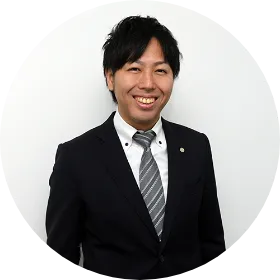
- Ryota Yanagimoto
- Administrative Scrivener/Judicial Scrivener
At the age of 24, he passed the national examinations for judicial scrivener, administrative scrivener, and wage service manager at the same time.
While working as a full-time lecturer at a major prep school, he independently opened a legal office related to judicial scriveners and administrative scriveners,
and he has experience as a judicial scrivener and an administrative scrivener for more than 15 years so far.
He has been actively contributing to various industries such as publicly listed companies, real estate companies, financial institutions, elderly care services, and professional organizations by conducting seminars, lectures, and talks.
And now he has a record of over 60 presentations so far.
Furthermore, as the president of a Japanese language school announced by the Ministry of Justice and Acts, and an advisor to a real estate company (capable of handling foreign clients),
he has been involved in various aspects of industries related to foreigners.





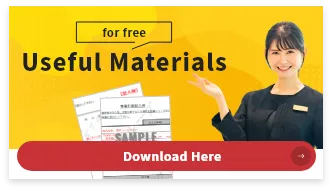
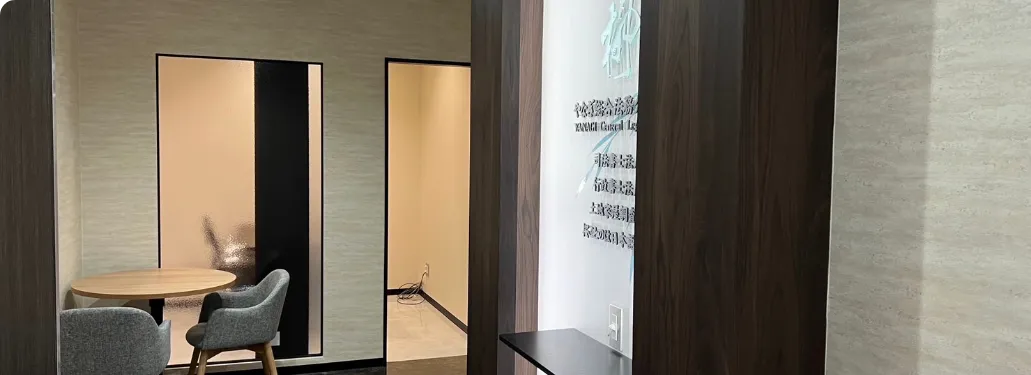
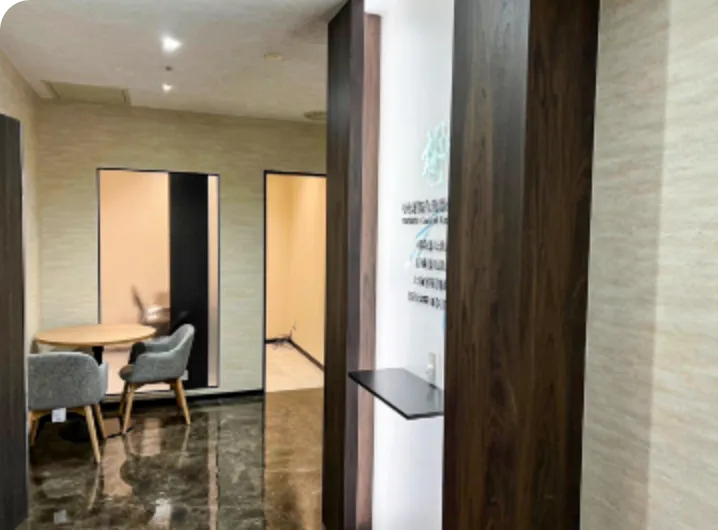
 0120-138-552
0120-138-552 Free
Consultation
Free
Consultation Contact Us
Contact Us